How to Get Started in Collecting Rare Coins on a Budget
Posted onOn a tight budget, the world of rare coin collecting can seem daunting, even to seasoned numismatic enthusiasts. This piece will unveil a treasure trove of strategies and clever tips to invest in a rare coin collection without breaking the bank. Our discussion will focus on:
- The factors that determine a coin’s rarity.
- The motivations that drive coin collectors.
- Rare coin collecting money-saving tips.
Watch an expert’s advice on how to collect coins on a budget in this informative video:
https://www.youtube.com/watch?v=JheVso1yXYA
What are rare collectible coins?
Understanding what makes a coin rare involves discerning myriads of factors, including its historical significance, design, and market demand. Among the many aspects influencing a coin’s rarity, three main determinants stand out prominently:
- Mintage: The concept of mintage plays a pivotal role in determining a coin’s rarity due to its direct correlation with supply. Mintage refers to the quantity of a specific coin produced during a certain period. When a coin has a limited production run, fewer specimens enter circulation or collector markets, intensifying its rarity.
Additionally, historical events, errors in production, or changes in economic conditions might influence low mintages, making certain coins even scarcer. Consequently, coins with low mintage figures become sought-after treasures within the numismatic community, commanding higher values.
- Condition: A coin’s condition, i.e. its preservation over time, significantly impacts its scarcity. Coins in pristine condition, with minimal wear, scratches, or damage, are scarce due to the natural aging process. When it comes to graded coins, those maintaining higher grades, indicating exceptional preservation, scarcity, and original luster, become rarer and more sought-after by collectors. The rarity of coins in remarkable condition is further accentuated by the scarcity of such specimens in the market.
- Age: A coin’s age is another factor that significantly influences its rarity. The passage of time inherently limits the availability of older coins, especially those from ancient or distant historical periods. Coins from antiquity or specific eras become rarer due to natural attrition, loss, or destruction, contributing to their scarcity.
For example, one can’t help but admire this beauty that we recently placed on Blanchard:
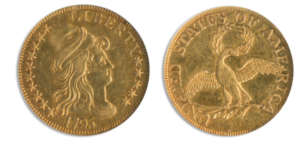
Why collect rare coins?
Humans’ fascination with collecting rare coins spans centuries. Mostly driven by the desire to preserve historical artifacts and the excitement of obtaining unique and scarce specimens, people have always been drawn to rare coins. This appreciation of rarity continues to fuel the enduring fascination with collecting rare coins.
Some of the main motivations that drive contemporary coin collectors are the following:
- Pleasure: One of the biggest reasons behind the pursuit of coin collecting is simply pleasure. Coin collecting is an enjoyable and deeply gratifying hobby. The joy derived from it lies in the thrill of the hunt as collectors seek elusive or unique coins. Furthermore, the sense of accomplishment and pride from building a curated collection fuels a feeling of personal satisfaction.
- Wealth Preservation: Investment Investment is a compelling reason for contemporary coin collecting. Certain coins possess inherent value and the potential for appreciation over time. Investors view rare coins as tangible assets with the capacity to diversify their portfolios beyond traditional options.
- Family Legacy: Rare coins are not only sought after for their scarcity but also serve as enduring heirlooms, passed down through generations. Old coins encapsulate stories of bygone eras, fostering a tangible link to ancestry. As such, they offer younger generations a glimpse into the past, igniting curiosity and a sense of connection with their heritage. The shared stories behind rare coins bridge generational divides, instilling a profound appreciation for familial legacy.
The pursuit of rare coins more often than not involves researching their origins, understanding their significance, and deciphering their stories, fostering a deeper understanding of history and artistry. Moreover, the process of collecting encourages critical thinking, research skills, and the development of a discerning eye, contributing to a well-rounded education.

Money-saving tips for rare coin collecting
Contrary to a prevalent misconception, acquiring rare coins within budgetary constraints is entirely feasible. How to get started in collecting rare coins on a budget? The secret lies in sticking to these ingenious tips:
1. Start collecting rare coins by purchasing lower-grade ones
A solid tip for foraying into rare and collectible coins on a budget is starting with lower-grade coins. Opting for coins rated on the lower end of the grading scale often presents an advantageous entry point for collectors.
These coins, while exhibiting more wear or imperfections, typically command lower prices compared to their higher-grade counterparts. Embracing coins with lower grades allows collectors to assemble a foundational collection without stretching their budget constraints.
Additionally, these lower-grade coins may still possess historical significance, unique designs, or belong to limited mintage series, providing an opportunity to delve into specific eras or themes within numismatics. As collectors advance and their budget permits, they can gradually upgrade their collection by acquiring higher-grade specimens.
2. Do research before building your rare coin collection
Conducting thorough research before commencing a rare coin collection proves to be a prudent money-saving strategy for enthusiasts on a budget. Delving into comprehensive research about the rarest coins to collect allows collectors to familiarize themselves with various aspects of coins they’re interested in, including historical contexts, mintage numbers, and market trends.
By acquiring this knowledge, collectors can make informed decisions and avoid overspending on overhyped or misrepresented pieces. Moreover, understanding the nuances of grading standards and recognizing reputable sources for purchasing coins ensures that collectors obtain genuine and fairly priced specimens.
Research also unveils underrated or undervalued coins, presenting opportunities to acquire noteworthy pieces within budgetary constraints.
To facilitate your research, Blanchard is readily available to assist. Our experts can provide personalized guidance on beginning, or adding to a coin collection, ensuring a well-informed and rewarding collecting experience.
3. Read books about rare coins collecting
While on the topic of research, books must, of course, be mentioned. Consulting a rare coin collection book may sound obvious, but it is instrumental for building budget-friendly collections. Books often highlight undervalued coins, offering valuable tips for identifying hidden treasures within budget constraints. To start, you can’t go wrong with The Guide Book of United States Coins, a.k.a. The Red Book.
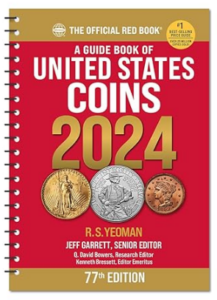
4. To successfully collect rare coins on a budget, be selective
It is easy to get carried away when choosing one’s rare coin collection for sale. However, successfully collecting rare coins within a budget necessitates a selective approach.
Being discerning allows collectors to focus on acquiring coins that align with their specific interests, goals, and budget constraints. By honing in on particular series, themes, or historical periods, collectors can avoid overspending on expansive or diverse collections.
Selectivity encourages patience, enabling enthusiasts to wait for opportune moments or favorable pricing for coins of higher significance or rarity within their preferred categories. This approach fosters a curated collection of exceptional coins, ensuring quality over quantity.
5. When it comes to collectible rare coins, start small
Many great numismatists started their collections with small, inexpensive coins. Indeed, that is a brilliant way of going about building one’s rare coin collection.
Starting with either smaller denominations or less costly coins enables individuals to build a foundational assortment without significant financial strain. This approach cultivates experience, providing an opportunity to understand preferences, grading standards, and market dynamics before venturing into higher-value acquisitions.
An excellent and economical rare coin to start one’s collection is the Morgan Dollar:
- Metal: Silver
- Year: 1878 – 1904
Get our most current price here.
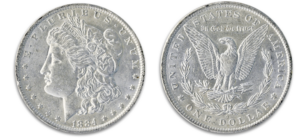
Another worthy contender is the coin created to take its place, i.e. the Peace Dollar:
- Metal: Silver
- Year: Varies
Get our most current price here.
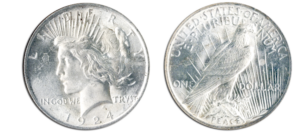
For help deciding which Peace silver dollar to add to your collection, ask a Blanchard expert.
6. Rare coin collecting is a marathon, not a sprint
Viewing building rare coin collections as a marathon rather than a sprint proves beneficial for budget-conscious collectors. Patience becomes a valuable asset as collections appreciate over time. Rare coins often increase in value gradually, rewarding collectors who hold onto their acquisitions.
Understanding this long-term growth potential allows enthusiasts to focus on strategic acquisitions aligned with their budget, rather than rushing into costly purchases. Additionally, over time, coins may gain historical significance or become rarer, increasing their value.
7. Rare collectible coins are all about quality
Prioritizing quality over quantity is paramount for building a rare classic coins collection on a budget. Opting for coins of superior quality, even if fewer in number, ensures lasting value and potential appreciation. Higher-quality coins tend to retain value and appeal, making them more desirable among collectors.
While initial costs of quality coins like this one may be higher, investing in coins with better condition, limited wear, and superior preservation often proves financially astute in the long run:
1885 Type III Gold $1 NGC PR65 CAC MS60
- Metal: Gold
- Year: 1885
View our most current price here.
8. Look for American rare coin collectibles at coin shows
Exploring rare coin collectibles at coin shows can be a savvy strategy for budget-conscious collectors. These events offer a diverse array of coins, providing opportunities to find unique and often undervalued pieces.
Coin shows facilitate direct interactions with dealers and sellers, allowing enthusiasts to negotiate prices or discover coins priced below market rates. Additionally, the variety of coins available at these shows, ranging from lesser-known series to rarities, presents a chance to unearth hidden gems that may not be easily accessible elsewhere.
Rarities like this beautiful coin can sometimes be found at coin shows:
1902 $2.50 Liberty PCGS MS65 CAC
- Metal: Gold
- Year: 1902
See our most current price here.
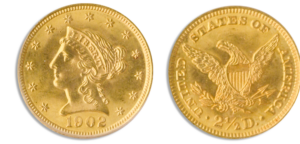
Click here to view more American rare coins and collectibles with CAC grading.
9. Joining a coin club is a great way to find rare coins to collect
Joining a coin club is an excellent avenue for budget-minded rare coin collectors to discover coveted pieces. These clubs foster a sense of community among enthusiasts, providing access to shared knowledge and trading opportunities for building a rare historical coin collection.
Members often offer coins for sale or trade at reasonable prices, allowing collectors to acquire rarities without hefty markups. Additionally, club meetings or events facilitate networking with experienced collectors who may offer guidance on finding undervalued or overlooked coins.
For example, an experienced numismatist might tell you that old commemoratives, like this one, are often a great investment:
1935-S San Diego 50c Commemorative PCGS MS65
- Metal: Silver
- Year: 1935
Have a look at our most current price here.
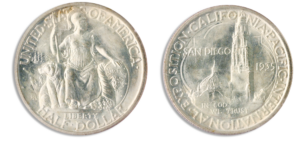
Read this piece to find out more about valuable commemorative rare coins and collectibles.
10. Use free apps and resources to build your rare coins collection
Leveraging free apps and online resources can prove invaluable for budget-conscious rare coin collectors. Utilizing free apps and online platforms provides access to a vast array of information, including market values, historical insights, and grading standards on a rare collectible coin, without incurring additional costs. This wealth of knowledge aids collectors in making informed decisions when acquiring rare coins.
Moreover, dedicated numismatic communities and forums on these platforms facilitate discussions, enabling enthusiasts to seek advice, exchange insights, and, on occasion, even discover potential acquisitions, like this great-value rare coin:
- Metal: Gold
- Year: 1857
Check our most current price here.
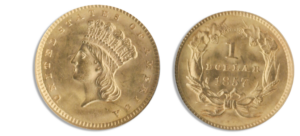
If you found this article engaging, you can delve further into the nuances of how to collect rare coins by consulting our rare coins guide.
Where to buy collectible rare coins
Embarking on rare coin collecting within a budget demands a strategic approach. Some of the keys to success include conducting extensive research, having patience, and prioritizing quality over quantity. To start building a valuable rare coin collection on a budget, simply use Blanchard. As the premier choice for precious metals investing, it is synonymous with quality coins at competitive prices.
Want to read more? Subscribe to the Blanchard Newsletter and get our tales from the vault, our favorite stories from around the world, and the latest tangible assets news delivered to your inbox weekly.







